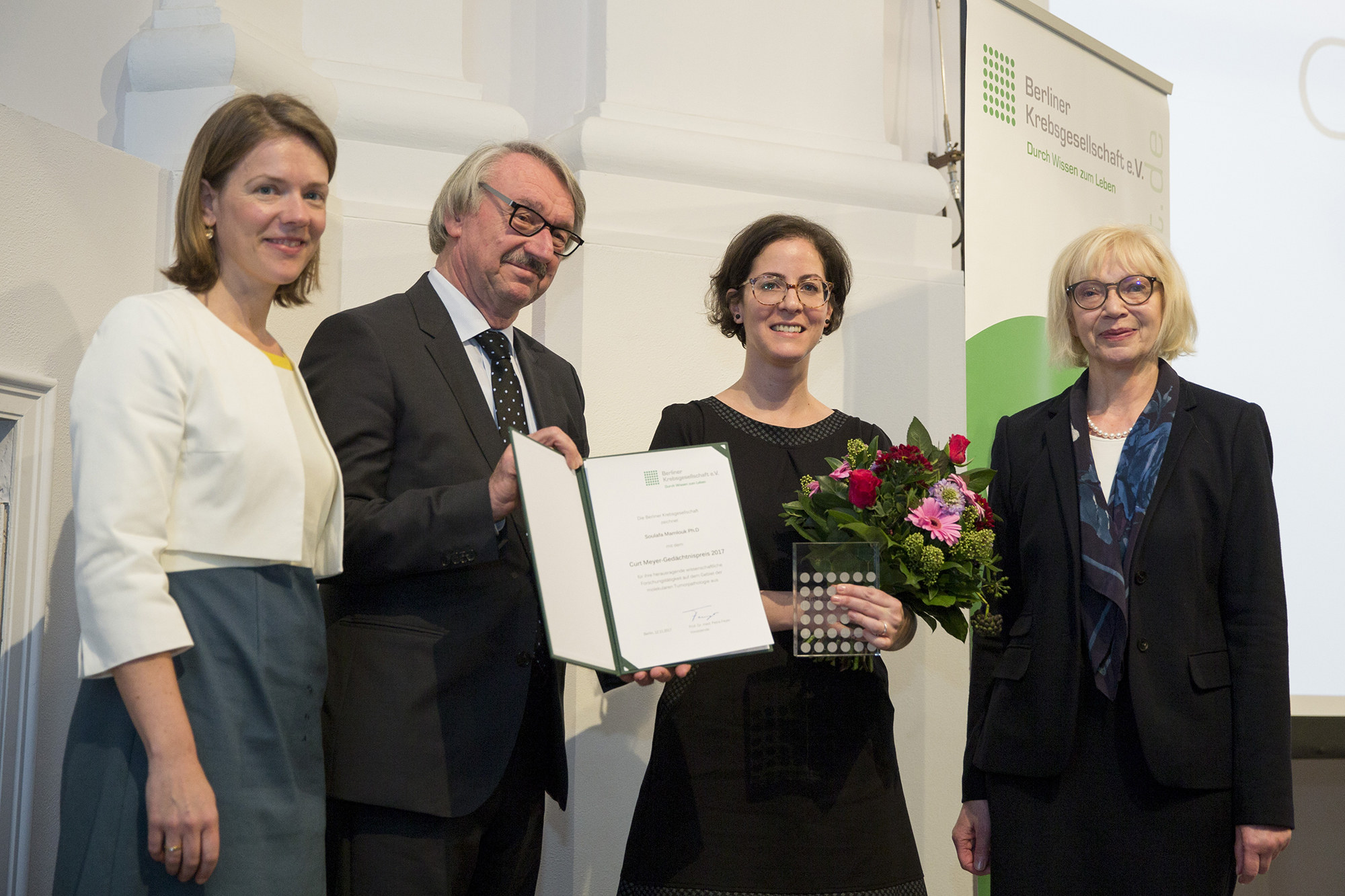12/11/2017
Print PageCurt Meyer Memorial Prize 2017 awarded to Charité researcher for her 3D model of a tumor’s genetic profile
Berlin, 13 November 2017 - Every tumor is as unique as humans themselves. There are differences between tumors of the same type in different patients, and even between the cancer cells within a tumor. Occasionally, tumor cells actually display more differences than similarities, which is why patients often respond differently to the same treatment. Using a 3D tumor model, Soulafa Mamlouk has, for the first time, produced a spatial representation of where cancer-relevant genes and chromosome segments are located inside a tumor. She was presented with the Curt Meyer Memorial Prize 2017 for her work during the Berliner Krebsgesellschaft’s 60th anniversary celebrations on 12 November 2017.
Prof. Günter Stock, Chairman of the Einstein Foundation Berlin, who made the prizegiving speech, explained why the Berliner Krebsgesellschaft’s management board decided to award the prize to the Charité scientist: “Soulafa Mamlouk shows us the extent of heterogeneity that’s possible within a single tumor. Her model is remarkable and confronts us with the question: could biopsies taken from just one point in a tumor be a pioneering method of determining its genetic profile?”
The regions of a tumor are genetically different
Mamlouk has spent years investigating which molecular and cellular mechanisms are responsible for resistance to treatment in colon cancer. To increase her understanding, she conducted a three-year study involving molecular genetic analyses in 27 patients with advanced colon cancer, and examined a colon tumor in minute detail. Mamlouk and her team deconstructed the tumor with 68 samples from different tissue regions and then analyzed 100 known genes that are frequently mutated in colon cancer. She then reconstructed the genetic differences in a 3D tumor model. “For us, it was about obtaining a spatial representation of the genetic diversity of the tumor,” she explains. “And we were surprised in the end because the individual tumor segments are not very different in terms of the type and number of mutations, but there were considerable differences in the number of certain gene copies.” In some tumor regions, she found large numbers of gene copies, while in other areas, the number had remained unchanged. For instance, there were high gene copy numbers at the intersection between outer and inner tumor regions. She also found high numbers of gene copies in the invasive tumor regions – the part that grows into the adjacent healthy tissue. “Until now, we thought that mutations were the main driving force behind the onset and spread of cancer. Our results indicate that tumor growth and response to treatment are also significantly affected by the duplication and deletion of certain genes. We should therefore be paying much more attention to these tumor characteristics during routine diagnosis in cancer patients,” Mamlouk concludes.
Soulafa Mamlouk is a researcher within the German Cancer Consortium (DKTK) and has been conducting research in the Molecular Tumor Pathology group at Charité’s Institute of Pathology with Prof. Christine Sers since 2013. After completing her schooling in Syria, she studied biotechnology and genetics in Jordan and Germany. She completed her education with a PhD in tumor immunology in Dresden. The results of the study* presented here were published in Nature Communications in January 2017. Soulafa Mamlouk is the first author of the paper, to which other researchers within the German Cancer Consortium (DKTK) also contributed: from the Charité Institute of Pathology, Humboldt University of Berlin, and the universities of Dresden, Saarbrücken and Heidelberg.
*Mamlouk S, Childs LH, Aust D, Heim D, Melching F, Oliveira C, Wolf T, Durek P, Schumacher D, Bläker H, von Winterfeld M, Gastl B, Möhr K, Menne A, Zeugner S, Redmer T, Lenze D, Tierling S, Möbs M, Weichert W, Folprecht G, Blanc E, Beule D, Schäfer R, Morkel M, Klauschen F, Leser U, Sers C. DNA copy number changes define spatial patterns of heterogeneity in colorectal cancer. Nat Commun. 2017 Jan 25;8:14093. doi: 10.1038/ncomms14093.
The Curt Meyer Memorial Prize
The Berliner Krebsgesellschaft has been awarding the Curt Meyer Memorial Prize since 1988. With prize money of EUR 10,000, it is one of the most valuable awards in Germany in the field of cancer medicine. The prize commemorates Dr Curt Meyer (1891–1984), a physician and Berlin Senator, who, after working as a practicing physician and district medical officer in Thuringia and Berlin, was arrested in 1944 and deported to the Auschwitz concentration camp. After 1945, Curt Meyer reorganized the health sector in former West Berlin, with a particular focus on health care. He was later awarded the Ernst Reuter medal for his work. The Berliner Krebsgesellschaft evolved from the Landesausschuss Berlin für Krebsbekämpfung, of which Dr Curt Meyer was a founding member and, for many years, its managing director.
Caption: Winner Soulafa Mamlouk at the award ceremony on 12 November 2017: (f.l.t.r.) Kristina Zappel (Managing Director Berliner Krebsgesellschaft e.V.), Prof Dr Dr Günter Stock (Chairman Einstein Foundation Berlin), Soulafa Mamlouk Ph.D (German Cancer Consortium), Prof Dr Petra Feyer (Chairman Berliner Krebsgesellschaft e.V.). (© Berliner Krebsgesellschaft)
